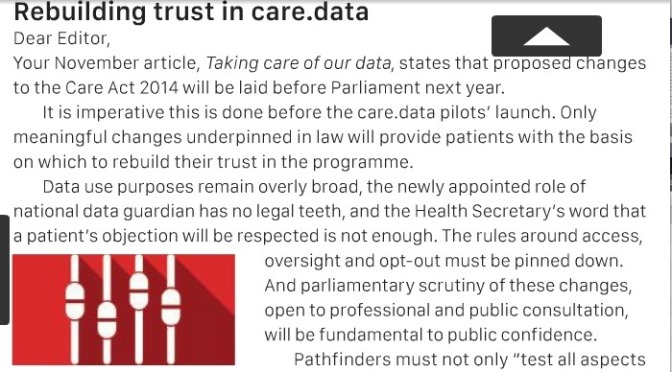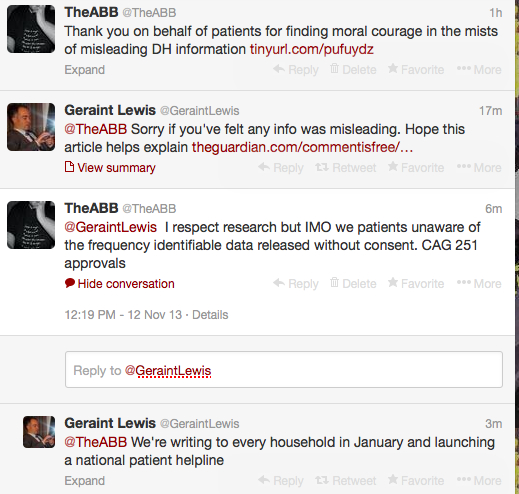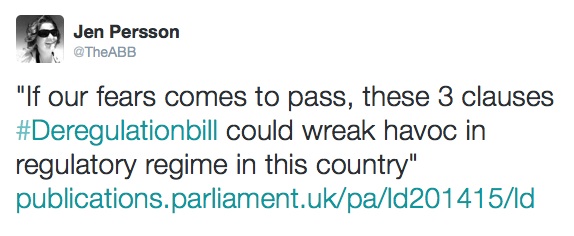This section of the Deregulation Act which is currently passing through Parliament, suggests the removal of any regulation that conflicts with the interests of a profit-maker.
There are domestic and regulatory bodies for which we should carefully consider this implication.
The Deregulation Bill surely creates an ethical conflict or at least challenge, when in law it must consider commercial gain on a statutory footing above other factors?
The clause is openly worded, that regulatory action should be taken only when it is needed and that any action taken should be ‘proportionate’.
That suggests that regulatory interventions should be reduced. Who and how will it be decided when and what is proportionate?
The Bill provides that a person exercising a regulatory function specified by the Minister:
In detail, what does that mean? If it’s not important why include it at all? If it is important, why have we heard so little about it?
That Lord Tunnicliffe would make such a forceful statement should not be taken lightly: …”if our fears comes to pass, these three clauses could wreak havoc in a regulatory regime within this country.”
Which bodies will this affect?
Functions to which section 83 applies:
There is a long list of regulatory organisations at the end of this post.
The implications for them are unclear but should be examined for public bodies whose function today is not for profit.
For one area in particular, and close to my heart, we should understand its impact on regulation of the NHS; Monitor and CQC, the MHRA and HFEA (Fertility and Embryology) and how about the Human Tissue Authority? A body whose purpose is to:
“manage the interests of the public and those we regulate at the centre of our work. It aims to maintain confidence by ensuring that human tissue is used safely and ethically, and with proper consent.” [Ref: HTA]
It is unclear how this profit aim will be helpful for these bodies in healthcare, especially considering some of the issues in state social care .
A different body where others share a concern about the impact of clause 83 is for the EHRC.
The Joint Committee Reported on Human Rights, June 14th 2014 has concerns about the impact of this, listed in this report:
The Government intends this economic growth duty to apply to the EHRC. We believe that applying this growth duty to the EHRC poses a significant risk to the EHRC’s independence, and therefore to its compliance with the Paris Principles and the Equal Treatment Directives as implemented by the Equality Act 2010. The Government is therefore risking the possibility of the EHRC’s accredited “A” status being downgraded and of putting the UK in breach of its obligations under EU equality law. Unless the continuing discussions between the Government and the Commission satisfy the Commission that the growth duty will not in any way impact upon its independence, we recommend that this duty not be applied to the EHRC.
[Nov 21st update: this clause was specifically debated > see Column GC229 < and whilst verbal assurances were made, it appears nothing has changed in the Bill, and that the EHRC said in response:
“While we welcome this undertaking we understand that this doesn’t mean that we’ll be removed on the face of the Bill”.
So what value the assurances from the Minister who will have left his post long before the Bill may be in effect?]
A large number of organisations play a part in securing compliance with the law. They include national regulators, local authorities, and bodies independent of Government, some of which have statutory regulatory functions. The list below of the main national regulators is not exhaustive, but long. Clause 83 will have a very wide reach.
We should understand just how wide ranging this apparently small function in the Bill may turn out to be.
I believe this clause will serve to mop up the real or imagined economic leakage that the government seeks to collect from all these bodies. Resources that are as yet, untapped.
How will these regulatory bodies promote economic growth?
I wonder how, in the best public interest at all times, economic interest should come first in bodies responsible for oversight?
Will they be compelled to consider [further] cost cutting, selling assets, or charging for services? Or how about entering into commercial partnerships?
Will the Drinking Water Inspectorate under DEFRA stay entirely independent?
What about the Gambling Commission – in its remit is ‘to protect children and vulnerable people from being harmed or exploited by gambling’?
How will the Office for Nuclear Regulation (ONR) hope to promote economic growth? Or the Forestry commission?
The consequences of such widespread promotion of deregulation and the requirement to actively promote profit seems ill-thought through and given little public attention.
Could it be that under austerity, and desperate to squeeze every drop of monetary gain from our state bodies, that this clause will open the gateway to increased fees, or the start of fees for some current non-charging access by the public to services?
Or will they be encouraged as schools were once, to sell off land and assets? Many of these bodies hold little land. The assets they both produce and hold, is data. It is clear from current practice and the direction of travel across government departments, that information is seen as a commodity and an untapped resource for sale. Perhaps this is an area each body will look at selling?
What about authorities which charge the public fees for services or could do so – the CAA for airspace regulation, the DVLA or the ICO? Will we see an increase in service charges – it is perhaps almost inevitable if the desirability to promote economic growth is to be given statutory footing.
In addition to looking at what may actively promote commercial growth by direct sale or raising fees, rather than imaginary direct marketing concepts, in order to promote economic growth, will we simply find it more likely that indirect growth is encouraged through change in regulatory practices?
Most importantly perhaps, will we see regulations slackened which cost money to oversee?
Will the organisations which are to be regulated, permitted to do more which promotes commercial interest over other policies, or ethics?
I wonder if a future state aims to deregulate the market in almost every field of activity to enable profits for private commercial businesses, and if the intent is not desirable economic growth for the state directly, but indirectly?
If so, will the ideology that once deregulated, somehow private business interests will contribute more to the economy than they do today, be realised in practice? How has the deregulation of trains, postal services, water and utilities benefited the public interest over economic growth?
If the benefit is to be state economic growth, whether through revenue direct or indirect, and whether or not it is achieved in the way it may be hoped, there will be other consequences.
Have we learned lessons from other areas in which oversight of regulation has been slackened in recent times, such as banking?
What happened since Banking was deregulated?
Anyone who can look back at the deregulation of the financial markets and say it was all, without any doubt a good thing, should say subprime mortgage deregulation and wash their mouth out.
“Regulation did not keep pace and became mismatched with the risks building in the economy. The Financial Crisis Inquiry Commission (FCIC) tasked with investigating the causes of the crisis reported in January 2011 that: “We had a 21st-century financial system with 19th-century safeguards.” [FCIC report]
“It found widespread failures in financial regulation; dramatic breakdowns in corporate governance; excessive borrowing and risk-taking by households and Wall Street; policy makers who were ill prepared for the crisis; and systemic breaches in accountability and ethics at all levels.” **[FCIC]
In summary, has any cost risk benefit analysis has been done on the impact of what this widespread cross-market promotion of deregulation and the desirability of economic growth in a regulatory function will mean?
Why may this be seen as a desirable course of action?
Deregulation is tacking its way to its destination through the Lords in the UK. Whether it will reach it before the end of this parliamentary term is perhaps unclear. But let’s not forget deregulation is the course on which we are set globally, at full steam ahead.
This UK Bill is simply a sponge on the deck of the Titanic of deregulation, the TTIP.
The purpose of the Transatlantic Trade and Investment Partnership is to remove the regulatory differences between the US and European nations. Its plan to cross the Atlantic at break neck speed has been somewhat slowed. But its purpose remains steadfast. There are effectively no tariff restrictions in place any more, so the barriers left to lift are those of regulatory intervention:
“The US and the European commission, both of which have been captured by the corporations they are supposed to regulate, are pressing for investor-state dispute resolution to be included in the agreement.” [The Guardian, Nov 4 2014]
This peer-reviewed paper looks at the imagined trade and its consequences, “leaving the investment component of TTIP on the sidelines. Going forward, valuable insights could be drawn by further extending the analysis of TTIP’s financial effects.”
[Update Nov 13, letter today in the FT: quotes the same research paper and notes, “Even the most vocal proponents of free trade admit that there’s nothing irrational about opposing such big issues of public policy being traded off behind closed doors.” Nick Dearden, Director, World Development Movement]
Whilst much is made, with some confusion, around the potential for impact on the NHS, TTIP is indisputably very real for the rest of industry and wider market. And any deregulation as a whole touches many NHS bodies.
Despite wide professional and public criticism the TTIP discussions continue with little transparency. Deregulation appears to have become the UK government’s mantra for achieving economic growth, though in coalition not everyone may agree it is right.
In conclusion:
There should be detailed analysis and an impact assessment made for this Deregulation Bill clause 83 as it stands alone.
It must also be seen in conjunction with proposals for deregulation under TTIP, and the impact analysed for the vast number of regulatory bodies and functions we have under the State wing, for the public good.
I sincerely hope our legislators in the Lords are taking this into account and not as a stand-alone Bill, but in the wider picture of current TTIP trade negotiations, and that the failures created in part through deregulation twenty years ago in banking, are not recycled now across the board.
Can society afford “dramatic breakdowns in governance, risk taking, learning by mistakes, or systemic breaches in accountability and ethics?” ** as we saw as a consequence in banking?
Oversight serves an important purpose.
It is often to ensure a balance between the needs of people, and search for profit. Whilst it is an accepted practice in our market economy, to seek to make a profit, oversight and regulation can ensure it’s not at the expense of the greater good.
Some of these public services that the regulatory bodies oversee in England will be harmed if they are not free to all at the point of their delivery. The independence of their ethical decision making will be challenged if it competes with promoting economic growth.
Who will help the public understand what this Deregulation Bill clause really will mean and complete proper and transparent public analysis of its impact for each regulatory authority?
I hope that those responsible for scrutiny of the Bill see value in maintaining first and foremost, independent oversight and ethics, in the Public Interest.
Or will the band continue to play as TTIP sails on? And will the Deregulation Bill pass as is, to promote the desirability of economic growth at all costs?
———
[Update November 21st:
Significant concerns raised in yesterday’s discussion by Lord Tunnicliffe and others on this Clause 83: The promotion of Economic Growth for Regulatory Bodies.
Social Care:
On a previous day of debate (Nov 18th) it appears regulation of Social Care staff is to be scrapped without proper consultation or scrutiny, in Clause 71.
Column GC116: “This is despite the fact that there was no clear support for removing regulation in the original consultation responses.
“The Government did not consult on this issue as part of the consultation in April 2014 on extending outsourcing in children’s social work. During the debate in Committee in the House of Commons on whether the clause should stand part of the Bill, the Deputy Leader of the Commons, Tom Brake MP, acknowledged that there had been no clear support for removing the registration requirement.”
“The Office of the Children’s Commissioner for England raised concerns and stated: “We consider all delegated social care services should be required to have formal registration with Ofsted in addition to an expectation that they will be held to account by rigorous and expert inspection, just as local authorities currently are”.
Scrutiny and Bill quality and clarity:
In particular concerns are raised in the Lords on lack of proper documentation and new legislation included which has not had scrutiny by the HoC or Scrutiny Committee.
Column GC142 “it is inefficient for Parliament to try to scrutinise line by line material which is obscure and possibly not very well expressed in terms of the material we are given and the notes.”
“One is that without a Keeling schedule relating to the particularities of the Bills being amended, it is almost impossible to work out what they are.”
Column GC144 “… that we are discussing now was not discussed in the Commons. It was not discussed by the Pre-Legislative Scrutiny Committee, as we have heard, and there has been no real opportunity to call those who drafted it to account. A blow for better government.”
Lord Tunnicliffe concluded on November 20th:
“We are all on the same side, but if our fears comes to pass, these three clauses could wreak havoc in a regulatory regime within this country that, generally speaking, is doing pretty well.” [Hansard]
My concerns seem founded, supported by many of these comments in recent debate in the Lords. I feel this Bill is a disaster lying in the future path of the Public Interest. “Iceberg, right ahead!”
End Nov 21st update.]
Please feel free to comment below or find me on twitter @TheABB
*********
List of The National Regulators
Animal Health and Veterinary Laboratories Agency (AHVLA)
Animals in Science Regulation Unit
Architects Registration Board (ARB)
British Hallmarking Council (BHC)
Care Quality Commission (CQC)
Charity Commission for England and Wales
Civil Aviation Authority (CAA)
Claims Management Regulation Unit
Coal Authority
Companies House
Competition Commission
Professional Standards for Health and Social Care (PSA)
Disclosure and Barring Service (DBS)
Drinking Water Inspectorate (DWI)
Driver and Vehicle Licensing Agency (DVLA)
Driving Standards Agency (DSA)
Employment Agency Standards Inspectorate (EAS)
English Heritage (EH)
Environment Agency
Equality and Human Rights Commission
Financial Reporting Council (FRC)
Fish Health Inspectorate (FHI), Centre for Environment, Fisheries and Aquaculture Science (Cefas)
Food and environment research agency (plant and bee health) and (Plant Variety and Seeds)
Food Standards Agency (FSA)
Forestry Commission
Gambling Commission
Gangmasters Licensing Authority (GLA)
Health and Safety Executive (HSE)
Higher Education Funding Council for England (HEFCE)
Highways Agency (HA)
HM Revenue and Customs (Money Laundering Regulations and National Minimum Wage)
Homes & Communities Agency (HCA)
Human Fertilisation and Embryology Association (HFEA)
Human Tissue Authority (HTA)
Information Commissioner’s Office (ICO)
Insolvency Service including Insolvency Practitioner Unit
Intellectual Property Office (IPO)
Legal Services Board (LSB)
Marine Management Organisaton (MMO)
Maritime and Coastguard Agency (MCA)
Medicines and Healthcare Products Regulatory Agency (MHRA)
Monitor
National Measurement Office (NMO)
Natural England
Office of Communications
Office for Fair Access (OFFA)
Office for Nuclear Regulation (ONR)
Office for Standards in Education, Children’s Services and Skills (OFSTED)
Office of Fair Trading
OFQUAL
Office of Rail Regulation (ORR)
Office of the Regulator of Community Interest Companies
OFGEM
Pensions Regulator
Rural Payments Agency (RPA)
Security Industry Authority (SIA)
Senior Traffic Commissioner
Sports Grounds Safety Authority (SGSA)
Trinity House Lighthouse Service (THLS)
UK Anti-Doping (UKAD)
Vehicle and Operator Services Agency (VOSA)
Vehicle Certification Agency (VCA)
Veterinary Medicines Directorate (VMD)
Water Services Regulation Authority (OFWAT)




